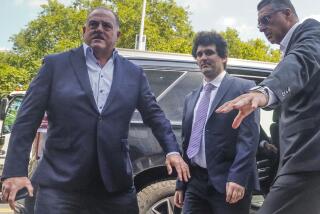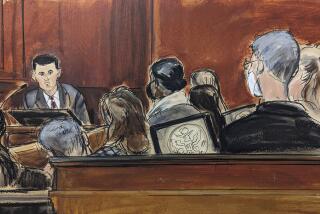Defense Targets Fastow’s Claims
- Share via
HOUSTON — Defense witnesses in the fraud and conspiracy trial of former Enron Corp. top executives Kenneth L. Lay and Jeffrey K. Skilling picked away at parts of the government’s allegations Tuesday, disputing earlier testimony that partnerships run by the company’s former finance chief received special treatment for buying problem assets.
Other witnesses also countered prosecution testimony that layoffs were disguised as reassigned jobs and that a troubled power project in India helped spell financial disaster.
Although none of the witnesses have launched an encompassing attack on the government’s case, they were intended to counter portions of prosecution testimony as a lead-up to the main event -- the defendants on the witness stand.
Lead Skilling lawyer Daniel M. Petrocelli said his client, the company’s former chief executive, probably would begin testifying Thursday -- a day later than he originally expected -- because two other witnesses were expected to be on the stand all day Wednesday.
Testimony continued without Lay’s lead lawyer, Michael Ramsey, who was undergoing tests in advance of surgery at a Houston hospital to unclog the carotid artery in his neck.
Lay, Enron’s founder and former chairman, said that he and the rest of his legal team would carry on without seeking to postpone the trial, and that they were confident Ramsey would return to court before the case ended.
In court Mark Metts, a former top executive in mergers and acquisitions for Enron, sought to counter testimony from former Chief Financial Officer Andrew S. Fastow that Skilling knew Fastow used personally lucrative partnerships to help the energy company hide losses and manufacture earnings.
Fastow told jurors last month that the second of the partnerships, known as LJM2, was created to warehouse failing Enron assets and investments so the energy company could book income and rid its ledgers of debt. In return, Enron ensured that LJM2 didn’t lose money, he said.
Metts said he’d never gotten the impression that Skilling favored LJM2 over other asset buyers. Describing the 2001 sale of an Enron wind power business, Metts told jurors: “Jeff agreed with me that the only way LJM would participate ... was if LJM played by the same rules as everybody else.”
Under cross-examination, however, Metts acknowledged he hadn’t encountered LJM until the wind deal came up. Enron had done many other deals with LJM throughout the previous year and emerged with profits, according to Fastow’s testimony.
Metts also sought to vouch for a lofty plan in 2000 to sell Enron’s international assets -- which Skilling had valued at half the $10 billion on Enron’s books -- to wealthy Middle Eastern investors for $7 billion. So-called Project Summer crumbled when the main investor fell ill.
More to Read
Inside the business of entertainment
The Wide Shot brings you news, analysis and insights on everything from streaming wars to production — and what it all means for the future.
You may occasionally receive promotional content from the Los Angeles Times.










